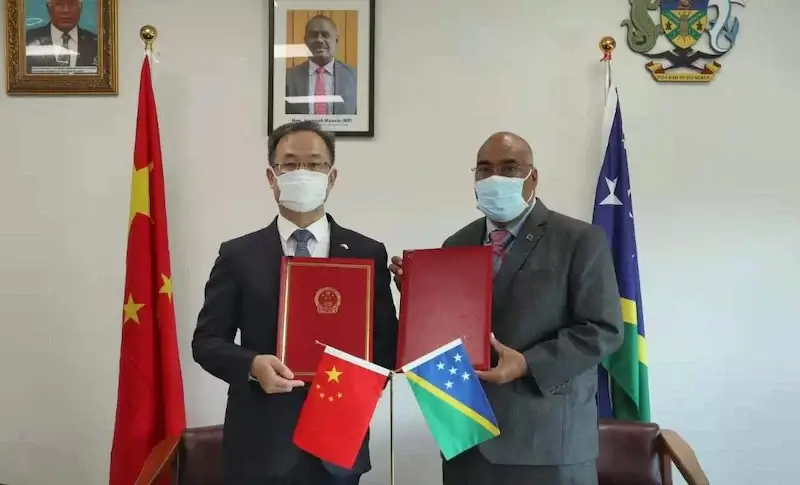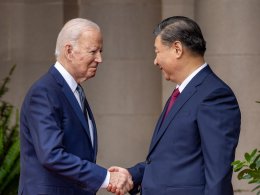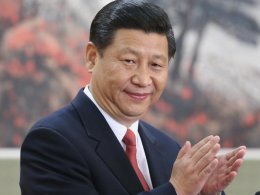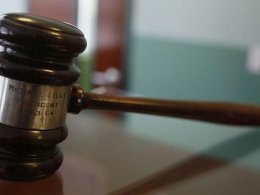China's Foreign Ministry spokesman Wang Wenbin announced the agreement in Beijing on Tuesday evening, saying it would involve China cooperating with Honiara on maintaining social order, protecting people's safety, aid, combating natural disasters and helping safeguard national security.
Solomon Islands Foreign Affairs Minister Jeremiah Manele confirmed the signing of the pact to the ABC in a text message.
He said Prime Minister Manasseh Sogavare would make a formal announcement in the coming days.
The announcement comes just days after Australia's Minister for the Pacific Zed Seselja travelled to Honiara and met the country's Prime Minister Manasseh Sogavare in a last-ditch effort to dissuade him from going ahead with the China security deal.
Senator Seselja and Foreign Minister Marise Payne said the government was "disappointed" by the agreement and that it was not reached in a transparent way.
"Ultimately, this is a sovereign decision of the government of Solomon Islands and we absolutely recognised that, but … declarations and these engagements on security issues have been dealt with in a Pacific-wide manner," she said.
"That is the traditional approach for these issues and it's why some Pacific partners have also raised concerns."
Senator Payne said the government's position was still that Pacific neighbours were the best to delivery security in the region and said it was an "unfair characterisation" to say the region had become less secure while Prime Minister Scott Morrison has been in power.
The ministers said while Solomon Islands had the right to make sovereign decisions about national security, Australia still believed the "Pacific family" was best placed to provide security guarantees.
They also flagged that Australia would continue to press Solomon Islands not to turn to China in the event of a security crisis.
When Honiara was rocked by violent riots in November, Australia responded rapidly to a request for help from Mr Sogavare, sending police and ADF personnel to the city to restore order.
China has also repeatedly insisted that it has no intention of displacing other countries in Solomon Islands, although both Canberra and Washington are deeply sceptical of that claim.
Mr Wang said the cooperation would be transparent and would not target any third party.
"The purpose of China-Solomon security cooperation is to promote social stability and long-term peace and security in Solomon Islands, which is in line with the common interests of Solomon Islands and the South Pacific region," he told a briefing on Tuesday.
"China-Solomon Islands security cooperation is public, transparent, open and inclusive, not directed at any third party, and is parallel to and complementary to the existing bilateral and multilateral security cooperation mechanisms in Solomon Islands.
Earlier on Tuesday, the Solomon Islands parliament was told China would send officials to the Pacific nation next month to sign cooperation agreements.
"The PRC [People's Republic of China] foreign affairs is heading to Honiara in the middle of May to sign multilateral agreements and cooperations with the Solomon Islands government," Douglas Ete, chairman of the public accounts committee, said.
The announcement came only a few days before senior White House official Kurt Campbell was due to visit Honiara as part of a concerted effort by both Australia and the US to dissuade Solomon Islands from pressing ahead with the pact.
On Monday, the US State Department warned that the pact "leaves open the door for the deployment of PRC military forces to the Solomon Islands" and set a "concerning precedent for the wider Pacific island region".
One diplomatic source told the ABC that the announcement was "clearly pushed through" by both countries ahead of Mr Campbell's visit.
Mr Wang questioned why the US was now interested in visiting the region, and said Pacific island nations were not "chess pieces in a geopolitical contest".
"Sensationalising an atmosphere of tension and stoking bloc confrontation will get no support in the region," he said.
"Attempts to meddle with and obstruct Pacific island countries' cooperation with China will be in vain."
While Mr Sogavare has declared that his country will not allow China to build a military base there, the broadly worded draft text leaked last month leaves the door open for Beijing to send troops to Solomon Islands to protect Chinese built infrastructure.
It also says China can “carry out ship visits to, carry out logistical replenishment in, and have stopover and transition in Solomon Islands".
New Zealand academic and Pacific security expert Anna Powles told the ABC that the final text was “unlikely” to be made public, “consistent with other PRC security agreements”.










